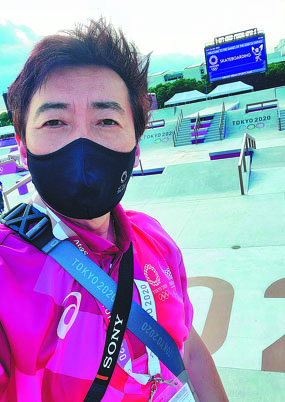Sport jumps from streets to podium

Tian Jun from China is the sole Asian judge of the street skateboarding event at the Tokyo Olympics. [Photo provided to China Daily]
Once edgy and at the margins of youth culture, skateboarders have entered the mainstream of sports and today are Olympic athletes.
Now in his 40s, Tian Jun has witnessed the growth of the sport in China in recent decades. His parents gave him his first skateboard in 1992 when he was 16. It was a reward for performing well in the senior high school entrance examination in Lanzhou, Gansu province.
To teenage Tian, the board was a shiny object of wonder with glass-smooth wheels ready to unleash gravity-defying feats. He said it didn't take him long to master it.
Some 30 years later, he served as a judge in the skateboarding competition at the Tokyo Olympics, drawing on his experience as a rider and skateboard shop owner.
"I feel lucky and proud to be able to connect at the Olympic level representing China's skateboarders," he said over the phone from a quarantine hotel in Guangzhou, Guangdong province, following his return from Tokyo.
After high school, Tian picked English as his major at a university in Nanjing, Jiangsu province, as he figured it would make it easier to read magazines and watch videos about skateboarding.
In 1995, before starting university, he entered a national skateboarding contest in Qinhuangdao, Hebei province. "There were only about 100 contestants from across the country," he said. "We were there for fun. It was not a standard contest. We were all teenagers. We met many new friends. Some of them are still in this field."
After graduation, Tian got a job in Guangzhou, but he often thought about running a skateboard shop. In 2006, he opened a shop in Guangzhou and eventually quit his job to spend more time on skateboarding.
"My family opposed it," he said. "They felt skateboarding was not a regular business back then. They thought I was crazy."
Tian's family finally accepted his decision and some relatives helped him at the shop. This gave him more time to attend skateboarding events across the country, judging competitions and sponsoring riders when the sport was undergoing commercial development in China.
In August 2016, skateboarding rose to national prominence after it was confirmed as an Olympic sport and scheduled to make its debut at the 2020 Tokyo Olympics. The next year, Tian was the head judge of the skateboard competition at the National Games in Nanjing.
Tian launched his first training school in 2018, and he now has eight. "Such schools allow young people to learn in a standardized way to help sustain their passion. If they can become professional, they will join city, provincial or national teams. Then we will have a complete industry."
In 2018, Tian judged his first international event at the 18th Asian Roller Skating Championship in Namwon, South Korea, in 2018. The next year he was invited by World Skate, the sport's governing body, to judge an Olympic qualification point race. In May, he was authorized as a skateboard judge for the Tokyo Olympics, the only one from Asia at the Games.
A fully developed skateboarding industry is now emerging in China, and a new generation of parents is more accepting of the sport, Tian said. But more promotion is needed.
"I believe that with a better atmosphere-from the perspective of the government, commercial development and the passion of the athletes-the development of skateboarding in China will be faster and better, be it in the Olympic Games or on the street," he said.
Chinese rider Zhang Xin will compete in the women's park skateboarding event on Wednesday.
Wu Yiying contributed to this story.



 Print
Print Mail
Mail

